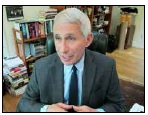Dr Fauci Warns of New COVID Symptoms You Need to Know
By Alek Korab

This week, the United States reached a grim milestone: More than 200,000 deaths attributed to the coronavirus. On last night's The Daily Show with Trevor Noah, Dr Anthony Fauci, director of the National Institute of Allergy and Infectious Diseases, said that number was not, as has been said, overstated, and also outlined some frightening cases of COVID among the living. Read on to know what symptoms to watch for, and to ensure your health and the health of others, don't miss these Sure Signs You've Already Had Coronavirus.
Three Newer Complications Trouble Fauci
"I think the 200,000 deaths that you're talking about are a good reflection of people that likely would not have died if they didn't have this infection," Dr Fauci said when Noah asked him if the number was inflated. "The thing that I think we need to be careful and humble about is, we don't know everything about this infection, but when we're starting to see right now, or a couple of things that are troubling to me." Here's what he's most concerned about:
1. "First of all, more and more young people you see, when you look at it, are getting into some significant trouble, not a lot, not a high percentage. That's true." "Last month, the Centers for Disease Control and Prevention said the number and rate of coronavirus cases among children under 18 had increased 'steadily' from March to July," reports the Washington Post. "The agency emphasized that while COVID-19 remains more serious and prevalent among adults, a lack of widespread testing prevents public health experts from understanding the true incidence of infection for American children. A CDC study found that young people of color, much like their older counterparts, have been disproportionately hospitalized from COVID-19 compared to their White peers."
2. Fauci continued: "The other thing is that when people get infected, we're seeing more and more of lingering signs and symptoms, so that when you clear the virus, you may have weeks or months or so in which you just [feel] not quite right." "People with more severe infections might experience long-term damage not just in their lungs, but in their heart, immune system, brain and elsewhere," reports Nature. "Evidence from previous coronavirus outbreaks, especially the severe acute respiratory syndrome (SARS) epidemic, suggests that these effects can last for years. And although in some cases the most severe infections also cause the worst long-term impacts, even mild cases can have life-changing effects — notably a lingering malaise similar to chronic fatigue syndrome."
3. And Fauci went on: "The final thing is that they've recently done a study that was published in the Journal of the American Medical Association Cardiology, where people who recovered, even from disease that wasn't that severe—when you do MRIs or imaging sensitive imaging, you can see things like inflammation of the heart. Now they may not be symptomatic, but we want to make sure that six months or a year from now, they don't wind up with unexplained arrhythmias or premature heart attacks or cardiomyopathies."
"How the virus might damage heart muscle is just one question researchers are now probing," reports Science Mag. "Other studies are following people during and after acute illness to learn how common heart inflammation is after COVID-19, how long it lingers, and whether it responds to specific treatments. Researchers also want to know whether patients fare similarly to those with myocarditis from other causes, which can include chemotherapy and other viruses. In more than half of virus-induced cases, the inflammation resolves without incident."
"So the situation is not wrapped up about what is the full impact of this, which means we have to take it very seriously," says Fauci. "Even among people who are obviously in trouble and die. There's other people that we need to be concerned." As for yourself: if you feel any of the symptoms above, contact your medical professional immediately, and to stay safe during this pandemic, wear a face mask, social distance, avoid crowds, wash your hands and don't visit places you're most likely to catch Covid.
-----------------------------------------------------------------------------

